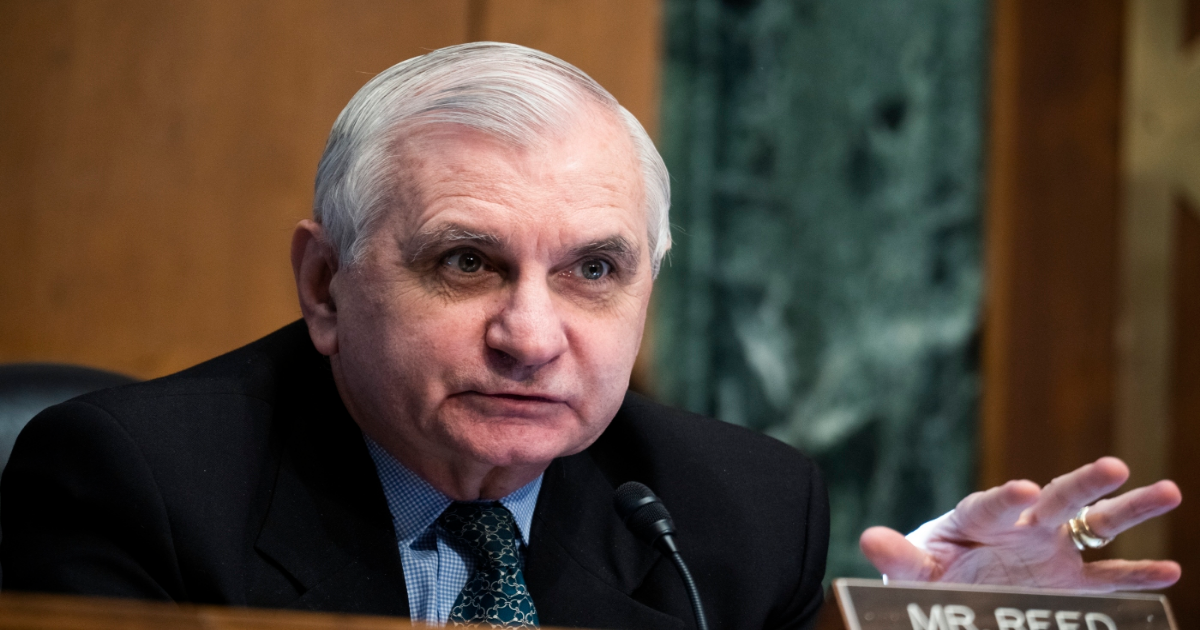
Sen. Jack Reed, D-Rhode Island, is calling for the Department of Defense to expand its existing evaluation into Defense Secretary Pete Hegseth’s use of Signal, which he has used to share sensitive military operations.
NPR first reported that the White House is looking for a new secretary of defense, after news surfaced that Hegseth shared sensitive military information in another Signal group chat. Over the weekend, The New York Times reported that the second chat included several people who are not Defense Department employees, including Hegseth’s wife, brother and personal lawyer.
“This is just a complete meltdown of common defense and it endangers our national security,” Reed told Morning Edition.
In March, The Atlantic‘s editor-in-chief, Jeffrey Goldberg, reported that he was inadvertently added to a Signal chat with Hegseth and other top U.S. national security officials, who were discussing planned military airstrikes on Yemen.
Hegseth has defended himself saying the information he shared in both group chats was informal.
“What was shared over Signal, then and now, however you characterize it, was informal, unclassified coordination for media coordination and other things,” Hegseth told Fox & Friends a day after news of the second Signal chat surfaced.
The Pentagon’s acting Inspector General Steven Stebbins is evaluating Hegseth’s use of Signal to determine whether classified information was shared in the initial group chat.
Mollie Helpern, a spokesperson for the Pentagon’s inspector general, told NPR that Stebbins is aware of news reports about Hegseth’s second Signal chat, and that the evaluation is ongoing.
Reed, the top Democrat on the Senate Armed Services Committee, fought hard against Hegseth’s nomination, consistently saying that “he does not have the experience to manage a major enterprise like the Pentagon.”
NPR’s Leila Fadel spoke to Reed about why he believes Hegseth is a threat to U.S. national security.
The following excerpt has been edited for length and clarity.
Leila Fadel: The Trump administration denies any classified material was shared in either of the two Signal chats in which the defense secretary participated. But you aren’t taking the administration at its word. Why?
Sen. Jack Reed: Well, the information was highly sensitive about the bombings and timing. Information that if we shared with our adversaries would have put our pilots lives at risk. And it’s a very basic mistake that no one in the military of any senior rank should make. I was opposed to Hegseth’s nomination. That’s why I fought vigorously against it, and we almost defeated it. But he’s confirming everything that we were saying. He does not have the experience to manage a major enterprise like the Pentagon. He does not operate according to the chain of command, in my view. He’s got a cadre of old buddies around him. And ironically, this week he fired a lot of his old buddies. So, this is just a complete meltdown of common defense and it endangers our national security.
Fadel: Is the administration cooperating?
Reed: Oh, the administration is not cooperating, I don’t think. There are rumors that they’re looking for someone else. If that’s the case, they better send up someone who’s a real professional with experience and maturity, judgment, appropriate temperament, and a profound commitment to the Constitution. Those are all things that are very suspect in Sec. Hegseth’s behavior.
Fadel: The Senate Armed Services chair, Republican Roger Wicker, joined you earlier this month in calling for the Defense Department watchdog to investigate. What are you hearing privately from your Republican colleagues on the Hill? Are they still confident about Pete Hegseth’s leadership?
Reed: I think there’s a great deal of anxiety and nervousness, because they’ve seen these displays and we have an organization that is the largest organization in the United States, basically, being run by someone whose previous experience running the veterans group virtually ended in bankruptcy. So, they’re wondering – we’re all wondering – if it’s going to be the same situation. It seems he has a lack of attention on details, and that is a critical, critical shortcoming with the secretary of defense.
NPR disclosure: Katherine Maher, the CEO of NPR, chairs the board of the Signal Foundation.
